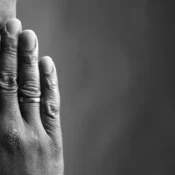How Does Grief Impact One’s Mental Health?
When you think about mental health, what is the first thought that comes to mind?
I come from a West African background where I grew up believing that having mental health challenges or illnesses was what was depicted in the Nigerian movies, where the person would lose their mind, lose their words and act expressively strange.

What picture comes to mind when you hear the words ‘mental health’?
It may be that the picture that comes to mind is of mental illness as I have earlier described, of your own experience, or that of someone close.
What is mental health?
Mental health can also be known as ‘emotional health’ or ‘wellness’ or ‘well-being’. But what is mental health? It is simply the health of your mind, this health is measured on a scale that goes from positive to negative.
I tend to imagine mental health as a gradient. For example if positive is the colour black and negative is the colour white, the varying degrees of mental health conditions will be all the shades of grey in between black and white.

In this post, we are going to look at how bereavement can affect our mental health. I will tell the story of how I have experienced negative mental health while grieving.
Mental health and bereavement: how do they relate?
Bereavement can have a huge impact on a person’s mental health. Especially for those that suffer with poor mental health already, we may see that their mental health deteriorates following the death of a loved one.
The same can also be true for mentally well people. Losing a loved one provokes such a deep, dark life-changing response that it is hard not to think that a person’s mental health wouldn’t be impacted to some degree.
I had always believed I was relatively strong growing up as I had to grow up fast especially as the first born of the family. I had experienced many challenges but believed I handled that very well, except for the fact that I would cry… A LOT.
I was known for crying. I believed this was an expression of my emotions, however, I would find that I would cry if I was running late or if I would miss the bus, or at most signs of disappointment. I look back and understand that it was my inability to cope with some of the stresses of life.
I will say that I don’t cry as much anymore, not because I did something special. But because I began to put disappointment in perspective of the grand scheme and also be kinder to myself.
So if I missed the bus and I was going to be late instead of blaming myself I would reflect on what I needed to do to be better and try to enjoy the rest of the journey. (Although it is not always easy).
I began building tools to help cope with life stresses. This looked like routines, eating well, exercising, and the beginning of self-awareness.

However, in 2016, I lost a close friend and stepbrother, one to a sudden illness and the other to suicide, coupled with a major family issue I was having, and this rocked my world. For the first time, the tears didn’t help, and neither did the tools.
I wanted to sleep and wake up in 5 years’ time.
I remember saying repeatedly that ‘I wanted to sleep and wake up in 5 years’ time. My rationale was that in 5 years I would definitely feel better, or at least a little better. As I didn’t want to experience this pain. Fortunately, for me God did not grant the request.
In what ways could grief affect one’s mental health?
This season affected my mood and made me anxious. I was afraid to receive a call or message with more bad news.
Fast forward to 2018 and I found myself facing the sudden loss of a spouse, just when everything was getting back to ‘normal’.
This sent my emotional health into a downward spiral and the tears came back in full force. Life felt bland and tasteless. I didn’t find anything enjoyable, I lost my appetite and barely ate for two years. As well as the pain of grief, I began to exhibit
- Anxiety
- Depression
- Anger
- Sadness
- Withdrawal
- Trauma
- Loss of appetite
- Loss of concentration
- Sleep deprivation
- Inability to make decisions
- Physical pain, chest pains

How grief affected my mental health
We have shared more on emotions of grief in previous posts.
The effects that I experienced on my emotional health during my darkest season of grief may probably be relatable to you if you have felt the pain of losing a loved one. These feelings are initially intense, but they are usually short-term.
Although in the case of depression it can deepen as the bereavement journey goes on. Especially when it feels like ‘everyone goes back to their ‘normal’ life and the bereaved feels both they and their loved one have been forgotten about.
- Depression
Depression is a long-lasting low mood disorder. If you or someone you know is depressed it means that you/they are persistently sad for weeks or months, rather than just a few days. Also, depression is not just being sad, it can usually affect how you do everyday things or enjoy life.
When I look back at my statement ‘I wanted to sleep and wake up in 5 years time’, on reflection I realise that I was probably exhibiting symptoms of low mood. Contrary to cultural suggestions you can’t simply snap out of depression. It is important to acknowledge the feelings and get help.
- Anxiety
If you have lost a loved one suddenly to an accident or illness you may have some anxiety around losing more people that you love, getting ill, being around people or travelling as it serves as a reminder to your loved one that may have died.
I experienced this some months after I lost my husband. I went to our favourite restaurant which we used to go to every Sunday after church. A friend offered to take me and the kids to cheer us up. I had no idea that I would respond the way I did.
I felt like the walls were closing in on me, I could hear the loud noises as though they were 10x louder, I found it difficult to stay still. I was basically having an internal panic attack. Except nobody knew, all they saw was me getting up to go and get air and sitting down again.
I couldn’t engage in conversation as my mind was preoccupied with all the mental chatter (conversations I was having with myself).
- Feeling stuck
Further into my bereavement journey, I started to feel better and less depressed but I had this overwhelming feeling of being stuck. Being unable to move forward. I did not know how, I didn’t think I could. I was disappointed by all the various things I had tried.
I was also unable to make decisions, which frustrated my family and friends but I just couldn’t make the final say. Sometimes this would mean that I avoided making a decision, even important ones.
Have you ever felt stuck?
I wanted to feel freedom and feel unstuck. I wanted to regain power and help myself instead of swimming in a loop of helplessness. But I didn’t know how. In late 2020, I went to the premiere of the movie ‘A Black Mind.’
where people shared their mental health stories. I was moved to tears as I heard the various expressions of how mental health had been shown (its head in the storytellers lives). At this point I knew I had to get help so I made a bold decision to try therapy.
This really helped just talking and having someone challenge my thought patterns. I became more aware of myself and how I process through these sessions.

How to cope with the grief effect on mental health
I have spoken of three major areas where my mental health was impacted due to grief.
However, I think it is important to understand that negative mental health can be seasonal and doesn’t necessarily have to last forever. That mindset in itself can make you feel stuck. You do have the power to take positive steps in the direction of improving your mental health.
It is possible, even if it is baby steps. But what I would say is that you can’t do it alone or by not acknowledging that it exists. There are so many ways to improve and maintain good mental health.
Here are 11 ways to manage grief’s effect on mental health
- Getting professional help, GP or Therapy
- Connecting with others through a support group or spending time with family and friends.
- Getting physically active, running, skipping walking any exercise that gets your heart pumping.
- Helping others, find a cause to support or help out people within your family or community.
- Getting enough sleep – 6-10 hours a night
- Cleaning and reorganising will help. Try to re-organise your internal clutter too.
- Listening to music
- Prayer and meditation
- Lighting a candle
- Diffuser with essential oils
- Journaling / creative writing
I especially found all of the above practices helpful. I also use these things to put some structure in my day, so that I experience pockets of well being activities throughout the day which affects my mental health in a positive way.
I may not do all of these things every day but when I notice I’m feeling a little anxious or a little sad I begin to lean into some of these practices and they certainly help me to cope with the stresses of life, work productively and contribute to my family and community.
Lastly, I want to encourage you, if you are exhibiting mental health challenges, you should aim to get help. Please do not be discouraged or ashamed, you are simply retraining the brain. The mind can be re-wired away from old negative patterns to new positive patterns.
So get help, create practices that help the mind. Be extra tender with yourself when you sense a shift in your mental health, or coming up to anniversaries, triggers or whenever you feel you are a little tender.
How has grief affected your mental health? Or perhaps you hadn’t realised that it affected your mental health until reading this post? We would love to hear your experiences. Please share your thoughts in the comments.

Abimbola is passionate about working with families to build resilience. She founded In Every Season, which aims to provide resources for those navigating through life’s various challenging seasons and help them sustain a healthy family dynamic. She also authored My Sisters Are Not Good At Wrestling, a children’s picture book on grief that will provide comfort and hope for children and adults.
Author
Recent Posts
Grief and Mental Health – Round Post
Collective Grief – Round Post
Getting Over The Death Of A Loved One
Your Story
Matters
info@balancedwheel.co.uk


